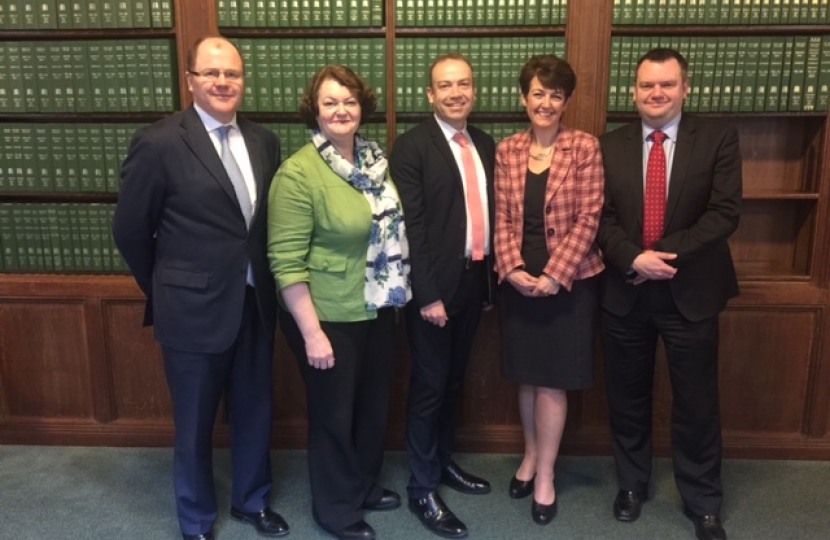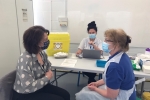
This week, at the end of a long parliamentary journey, the Access to Medical Treatments (Innovation) Bill received Royal Assent.
The Bill, which is now an Act of Parliament, was brought in by MP Chris Heaton Harris back in June. However it evolved considerably during its passage through Parliament, as MPs listened to concerns raised by the medical community. After 10 months of extensive cross party working, and with the addition of key measures on off-label prescribing, the Bill passed into law yesterday with the support of MPs from all parties.
The Act has the potential to make a real difference to patients by encouraging and expediting the spread of innovative, evidence based treatments, especially those for rare conditions or conditions where there is no currently licensed treatment. By creating a database of innovative medicines with clinically credible evidence of benefit to particular patient groups, the Bill is intended to accelerate uptake and dissemination of innovative drugs. Furthermore, by facilitating better information sharing it is hoped that it will support and encourage medical research in new areas.
Speaking yesterday as the Bill received Royal Assent, Chris Heaton Harris said, "In an age of ever-evolving medical treatment, this Bill will make sure the amazing work that goes on in our NHS every day is not isolated to one hospital, surgery or practice, but is easily seen and accessed by every registered medical practitioner searching for the best treatment. The appetite for encouraging access to new drugs and for innovative uses of existing drugs off-label has been made very clear throughout the passage of this Bill and I am delighted these measures have finally made it into law."
The Act empowers the Secretary of State for Health to create a database of innovative medical treatments, including new off-label uses of existing drugs. Its central aim is to ensure the effective collection and dissemination of information about innovative treatments
which patients may be eligible to access through schemes such as the Early Access to Medicines Scheme or clinical trials. It also seeks to support the use of off-label medicines for which there is good clinical evidence.
This has two strands. Firstly, with regards to new, emerging treatments, the Act seeks to make sure that data is shared across different research centres and that both the successes and failures of new treatments are readily available to clinicians up and down the country.
Secondly, its other key aim is to raise awareness of the off-label use of existing drugs which have been proven to be effective for other conditions. This includes drugs for breast cancer, Parkinson’s, multiple sclerosis and prostate cancer and the list is likely to grow rapidly as more new uses are found for old drugs. These ‘repurposed’ drugs, which are often very cheap, are regularly prescribed in specialist centres but are not consistently used across the country. It is thought that their routine use could not only save lives but save the NHS money.
Measures to support the use of off-label drugs have had strong backing across both Houses of Parliament, and, after his own Private Members’ Bill, the Off-patent Drugs Bill, was talked out in November, Labour MP Nick Thomas Symonds joined forces with Chris Heaton Harris to look at how his Bill could address the issue. Together with SNP spokesperson and breast cancer surgeon Philippa Whitford and Conservative MP Jo Churchill - a three time breast cancer sufferer and passionate campaigner on medical research issues – they amended the Bill extensively.
Speaking about the Bill’s journey Dr Philippa Whitford MP said, "Initially the Access to Medical Treatments (Innovation) Bill caused real concern within the medical and research community regarding the danger of changes to litigation surrounding the use of untested treatments. Through Cross-party working I was pleased to achieve the removal of these clauses while maintaining the commitment to a database on research, new drugs and the new indications for older drugs which are no longer under patent."
Nick Thomas-Symonds MP added, "I am thrilled that by working on a cross-party basis we have been able to secure these important steps forward on off-patent drugs. These measures will help to ensure that patients across the UK have access to cheap, potentially life-saving drugs.
"As I’ve learned first-hand, Private Members’ Bills rarely make it into law, but this is a great example of how by working together MPs can use the parliamentary system to extensively deliberate, debate and amend a Bill and achieve something that will have a real and lasting benefit for their constituents."
Jo Churchill MP also welcomed the Bill’s success, saying, "Despite the defeat of the Off-Patent Drugs Bill, the cross party advocacy for greater access to treatments, made collaboration across the House the key to unlocking patient benefits. Working together with
my parliamentary colleagues on the Medical Treatment (Innovations) Bill it has been possible to advocate for the broader use of repurposed drugs. It has shown what can be achieved by Parliament to the benefit of patients.
"As a former patient and healthcare campaigner, these outcomes are a priority to me. Now, with the power to use repurposed, off-patent drugs as well as the delivery of a database; the treatment of cancer and rare diseases will be advanced. My hope is that, off the back of both science and sensibility, more lives can be saved."
Minister for Life Sciences George Freeman, who is a key advocate for supporting medical innovation said,
"Whilst it is unusual for Ministers to work on a cross-party basis to support a Private Members Bill and the Government could not support the mechanisms in the original Bill, I was determined to try and help find a mechanism to promote access to innovative medicines which we can all agree on. This is a great day for Parliament and patients."
